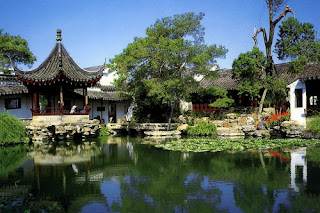Chapter Three
Gardens in Suzhou—Beautiful & Wonderful
Suzhou is a major city located in the southeast of Jiangsu Province in Eastern China, located adjacent to Shanghai. The city is situated on the lower reaches of the Yangtze River and on the shores of Taihu Lake and is a part of the Yangtze River Delta region.
 |
| Garden Scenery |
Originally founded in 514 BC, Suzhou has over 2,500 years of rich history, and relics of the past are abundant to this day. The city’s canals, stone bridges, pagodas, and meticulously designed gardens have contributed to its status as one of the top tourist attractions in China.
Since the Song Dynasty (960-1279), it has also been an important centre for China’s silk industry. It is well-known as the capital of silk. The classical gardens in Suzhou were added to the list of the UNESCO World Heritage Sites in 1997 and 2000. Suzhou is often dubbed the "Venice of the East"
Suzhou has long been a heaven for scholars, artists, and skilled craftsmen, and this is still the case today. In its many beautiful gardens and courtyard parks, Suzhou’s ancient heritage has been preserved.
The Classical Gardens
The Classical Gardens of Suzhou is a group of gardens in Suzhou region, Jiangsu province which have been added to the UNESCO World Heritage List.
Spanning a period of almost one thousand years, from the Northern Song to the late Qing dynasties (11th-19th century), these gardens, most of them built by scholars, standardized many of the key features of classical Chinese garden design with constructed landscapes mimicking natural scenery of rocks, hills and rivers with strategically located pavilions and pagodas.
 |
| Humble Administrator's Garden |
Though smaller and less elaborate than the another well-known type of Chinese gardens, the opulent Imperial Gardens and Palaces in Beijing, the elegant aesthetics and subtlety of these scholar’s gardens in many ways contrast with the grandeur of the former, and their delicate style and features are often imitated by various gardens in other parts of China, including the Imperial Gardens, such as those in the Chengde Mountain Resort.
According to UNESCO, the gardens of Suzhou "represent the development of Chinese landscape garden design over more than two thousand years," and they are the "most refined form" of garden art.
These landscape gardens flourished in the mid-Ming to early-Qing dynasties, resulting in as much as 200 private gardens. Today, there are 69 preserved gardens in Suzhou, and all of them are designated as protected "National Heritage Sites." In 1997 and 2000, eight of the finest gardens in Suzhou along with one in the nearby ancient town of Tongli were selected by UNESCO as a World Heritage Site to represent the art of Suzhou-style classical gardens.
 |
| Garden of the Master of the Nets |
The Humble Administrator’s Garden is a renowned Chinese garden in Suzhou. At 51,950 m2, it is the largest garden in Suzhou and is generally considered to be the finest garden in all of southern China. In 1997, Zhuozheng Yuan, along with other classical gardens of Suzhou was proclaimed a UNESCO World Heritage Site.
This garden, meant to express the owner Wang Xiancheng’s fine taste, was designed in collaboration with the renowned artist, Suzhou native, Wen Zhengming. It showed the owner’s desire to retire from politics and adopt a hermit’s life in the manner of Tao Yuanming.
The well –known Chinese novelist Cao Xueqin lived at the garden during his teenage years. It is believed much of the garden in his novel Dream of the Red Chamber was inspired by the scenery of the Humble Administrators Garden. In particular, the grotto at the entrance is the most famous.
The Garden of the Master of the Nets is among the finest gardens in China. It is recognized with other classical Suzhou gardens as a UNESCO World Heritage Site. The garden demonstrates Chinese garden designers’ adept skills for synthesizing art, nature, and architecture to create unique metaphysical masterpieces.
 |
| Tiger Hill Pagoda |
The Master of the Nets is particularly regarded among garden connoisseurs for its mastering the techniques of relative dimension, contrast, foil, sequence and depth, and borrowed scenery. Originally created in 1140, and recreated in 1770 by the bureaucrat Song Zongyuan. The enclosed complex of house and garden is one of the smallest, most beautiful, and most perfectly proportioned in Suzhou.
Tiger Hill is a popular tourist destination and is known for its natural beauty as well as historical sites. The hill is so named because it is said to look like a crouching tiger. Another legend states that a white tiger appeared on the hill to guard it following the burial of King Helü.
The hill is sometimes referred to in parallel with "Lion Mountain", another hill near Suzhou which clearly resembles a sitting lion.The hill has been a tourist destination for hundreds of years, as is evident from the poetry and calligraphy carved into rocks on the hill.
Its features include:
Sword-Testing Rock: a rock in two pieces that was supposedly cleaved cleanly by a legendary sword of extraordinary sharpness
Spring of Simplicity and Honesty: a well that, according to legend, first appeared as a spring to exhausted monk carrying water up the entire length of the hill
Yunyan Pagoda: a pagoda seven stories in height whose main architectural feature is its lean; it in fact predates the Leaning Tower of Pisa
Sword Pond: a small rectangular pond, beneath which have treasures of some 3000 swords are believed to have been buried; this site is not excavated because the Leaning Pagoda’s foundations rest on the site.
In a word, gardens in Suzhou are really good combination of nature and man-made architecture arts. If you want to appreciate something special in China, then Suzhou Gardens will actually give you the impressions of beautiful and wonderful.
